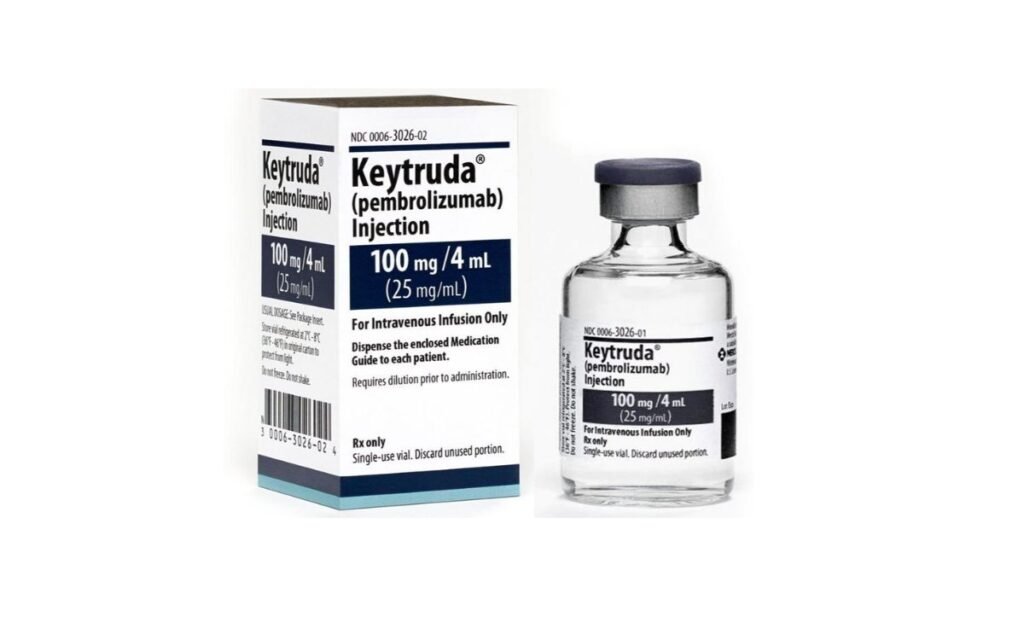Merck & Co. made significant strides at this year’s European Society for Medical Oncology (ESMO) congress, presenting a series of groundbreaking studies highlighting Keytruda’s efficacy across multiple cancer types. However, there was one notable setback.
Keytruda, Merck’s PD-1 inhibitor, demonstrated complete and partial victories in cervical cancer, early breast cancer, and stomach cancer across four distinct studies when used in combination with other cancer medications. Regrettably, Keytruda fell short of expectations in the context of aggressive prostate cancer.
Let’s delve into the encouraging developments first. In the phase 3 trial known as KEYNOTE-A18, which lasted approximately 18 months, Keytruda, in conjunction with concurrent chemoradiotherapy, exhibited a 30% reduction in the risk of disease progression or death compared to chemoradiotherapy alone. For patients with high-risk, locally advanced cervical cancer, progression-free survival reached 67.8% at the 24-month mark, surpassing the 57.3% observed in those treated solely with concurrent chemoradiotherapy.
While the results regarding Keytruda’s potential to extend overall survival were promising, they did not attain statistical significance at the time of Merck’s interim analysis. Nonetheless, KEYNOTE-A18 remains ongoing, with Merck diligently monitoring for additional overall survival data.
Marjorie Green, Senior Vice President and Head of Late-Stage Oncology Development at Merck, emphasized the significance of these findings. She highlighted that there have been no updates to treatment standards for locally advanced cervical cancer patients since 1999 and that early intervention with Keytruda in combination with chemoradiotherapy could substantially reduce the risk of cancer recurrence and death.
In light of these positive outcomes, Merck has secured a priority review for its Keytruda-radiochemotherapy combination in newly diagnosed, high-risk locally advanced cervical cancer. The FDA is expected to make a decision on approval by January 20, 2024.
Keytruda already possesses approvals for cervical cancer treatment in later stages, offering options for patients with PD-L1-expressing tumors with or without Avastin, as well as for those with disease progression following chemotherapy. Merck also disclosed more comprehensive results from the late-stage trial KEYNOTE-756, assessing Keytruda alongside chemotherapy as a neoadjuvant treatment, followed by Keytruda and endocrine therapy as an adjuvant regimen for patients with high-risk, early-stage estrogen receptor-positive, human epidermal growth factor receptor 2-negative (ER+/HER2-) breast cancer.
Patients who received the Keytruda-chemotherapy regimen before surgery achieved a remarkable 24.3% pathological complete response rate, surpassing the 15.6% in patients treated with chemotherapy alone. The study continues to evaluate event-free survival, another primary endpoint.
In another piece of good news, Keytruda, when combined with Herceptin and chemotherapy, decreased the risk of disease progression or death by 28% at 28.4 months in newly diagnosed HER2-positive stomach cancer patients compared to Herceptin and chemotherapy alone. Keytruda initially received gastric cancer approval in 2021 based on tumor shrinkage data, and Merck is collaborating with the FDA to expand the indication to include disease progression data in patients with PD-L1-expressing tumors.
In the phase 3 trial KEYNOTE-811, the Keytruda-Herceptin-chemotherapy combination reduced the risk of disease progression or death by 30% in patients with PD-L1-expressing tumors, although no benefit was observed in PD-L1 negative patients. The interim analysis demonstrated a positive trend in overall survival, although statistical significance was not reached. Monitoring of overall survival in KEYNOTE-811 will continue.
Unfortunately, Keytruda faced a setback in metastatic castration-resistant prostate cancer (mCRPC). Keytruda, when added to Astellas and Pfizer’s Xtandi and androgen deprivation therapy, did not provide any survival benefit or prevent cancer progression in mCRPC patients who had not previously undergone chemotherapy. Consequently, Merck discontinued the study, coded KEYNOTE-641, on the recommendation of an independent data monitoring committee in February.
Despite this, Keytruda has been on a positive trajectory in recent weeks. It exhibited impressive results in combination with Seagen and Astellas’ Padcev in reducing the risk of death by 53% in bladder cancer patients eligible for cisplatin or carboplatin-containing chemotherapy. The median overall survival for patients receiving the combination regimen was 31.5 months, compared to 16.1 months for those on chemotherapy alone.
Furthermore, Keytruda recently obtained approval for use in both neoadjuvant and adjuvant therapy in patients with resectable non-small cell lung cancer.
Nonetheless, Merck faces future challenges, particularly concerning Keytruda’s exclusivity, which is set to expire in 2028, and potential pricing negotiations under the Inflation Reduction Act in 2026.





























